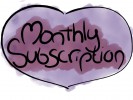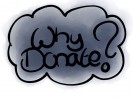Should this group be added to the Lgbtqplus umbrella? How about that? Isn’t the acronym long enough already?
I’m not terribly old, and I’m old enough to remember when LGBT was mostly LGB (and oh, the fights we had..). A short few years before that and it was barely an acronym in a lot of places. These days, of course, we’ve letters coming out our ears, never mind the disagreements about what half of them stand for.
And we still argue.
I think our arguments are, if not fundamentally wrong, then at least coming from a fundamentally incorrect space.
I remember an experience I had once at a demo. It was one of the few times I’ve ever been recognised by a stranger for my writing. They came up to me, asked if I was Aoife from the Tea Cosy. I said yes (secretly embarrassed and delighted in equal parts. There goes the secret), and we chatted a bit. And then they said something that has always stuck with me. They wanted to thank me for a post I’d written on queer communities a few months before, where I’d specifically mentioned other groups, including asexual people, who we should bloody we’ll be including. This person said it was the first time they ever heard a non-ace person mention ace people, and the first time they thought they might be welcome in our communities.
Well.
I think we’re creating these communities all wrong.
You see, while we officially describe our community as LGBTQ+, in practice it’s almost always the same: the gay community. The vast majority of resources and attention go to gay men (and then lesbian women). The assumption is that if you’re here, you’re gay. Those of us who aren’t gay- but aren’t cisgender heterosexuals either- end up having to defend our presence all the damn time. And the way we have to do so tends to be through establishing the answer to one question: whether their experiences are close enough to be mapped onto the lesbian or gay experience. This was what we argued with bi people- we have same-gender relationships too, you know. And trans people- aren’t homophobia and transphobia both forms of gender policing? And so on, and so forth.
But why should welcome to the LGBTQ+ communities be defined by how closely your experiences are to lesbians and gay men? Why does this one group- who, contrary to popular opinion, haven’t been around in our communities any longer than anyone else- get to define the boundaries of our spaces, to decide who belongs and who doesn’t, and to have a near-monopoly on the discourse around all of us?
This isn’t to say that I think we should open our communities to just anyone. There are good reasons why we create and develop separate and specific spaces. But let’s take a moment to think about what those reasons are, shall we?
If there’s one essential factor in the queer experience, it’s this: we have all experienced our sexual/romantic attractions (or absence of such) and/or our gender identities in non-normative ways, and we have all experienced exclusion because of that. Both of those factors manifest in vastly different ways, of course, but they’re always there.
If we define our communities by that, then we give ourselves the chance to get the hell away from privileging one kind of experience, group and voice above others. If we acknowledge that the ways that we experience noncisheteronormativity and exclusion don’t have to be the same, we create an opening for conversations on our diversities and similarities, and spaces both for all of us and for more specific needs and groups. I think that would be pretty great.
Even bloggers have to pay the bills! Monthly subscriptions- no matter how small- help give me the security to devote time to this place and keep a roof over my head:





Does this suggest that the real umbrella term here is something like “NotCH” – in a world of cisnormativity and heteronormativity, the common factor in the increasingly unwieldy LGBTQ… lists is the experience of being *Not Cis-Het*, so that should be the catch-all. I think “notch” sounds quite catchy.
Like having an International Students’ Association instead of The Association For Students From Afghanistan, Algeria, Andorra…. (deep breath) … Yemen, Zambia and Zimbabwe.
Hmmm, “notch” makes me think of something that goes on a bedpost though 😉
The issue with the whole NotCH and other new versions of the QUILTBAG acronyms is that it can be quite easy for them to be co-opted by pedophiles and people into bestiality.
Owch. That. That sure is a thing.
On the other hand, as a community it shouldn’t be too difficult (er, one would hope at least) to have standards that define healthy and acceptable sexuality based around mutuality and consent. But it sure does suck that it would have to be specified.
It’s a difficult one.
My experience as a Bisexual, Biromantic Trans* MtF is that I am not wanted or welcome around many – if not most – Cis-Gay/Lesbian folks.
I’ve been asked to justify my very existence as a woman, because obviously I simply lack the courage to live as an out Gay man.
I think it might just be too diverse a community, where the people who are ‘not-cis-heterosexual’ are a very large group who don’t necessarily have much in common, except not being cis and heterosexual. I’m not sure how much benefit there is to being part of LGBTPZXQM (you know what I mean). Of course, we all benefit from recognition within the larger community of everybody, but that’s another matter.
I don’t know, I like to think that we can find enough commonality in not fitting in to cisheterosexuality to create some kind of umbrella community, or at least a sense of common identity that isn’t just stuck in our little subgroups. I hope so, anyway.
I’d like to think so, too. It seems that all that’s been accomplished is to have Cis-Het “Normal”, or Cis-Gay “Normal”.
I don’t like the term “Queer”for myself, but I don’t want to tell other people they can’t choose that for themselves. I think that Bisexuals, Asexuals, Genderfluid people, Transgender people, and those that don’t fit any category are forgotten, excluded, and unwelcome everywhere else. I certainly think a group could be devised for adult people that do consenting activities with adults, but truthfully, I despair of it happening.
There are advantages to standing alone – I cannot be betrayed.
It is precisely because you feel that way — forgive the presumption here, but I’d actually be inclined to phrase it, “been made to feel that way by treatment you’ve received” — that a welcoming umbrella community, a community of communities if you will (and even if you won’t), is, I think, essential.
How’s that old line go — “If we don’t hang together, we’ll assuredly all hang separately”?
There’s strength in numbers, and power in organizing.
And I like Aoife’s take on the how of it.
I’d go for “Queer” myself — it seems simple and all-encompassing — though I recognize there might be some (or many) who would object.
But I’d also bet that comfort with the term skews heavily with age…
Cheers, all.
Aofie,
I’ve often thought that focusing on “mutual consent” works best, since neither minors nor animals can legally give consent. There are some acts that make me go ick—blood and scat, for instance—but I long ago concluded that once you moved past intercourse between legally wed spouses of opposite sex purely for the purpose of procreation, all sexual encounters are someone’s kink or taboo and trying to delineate any boundary other than “mutual consent” just couldn’t stand.
Jeff
[…] Queerness and Inclusion […]